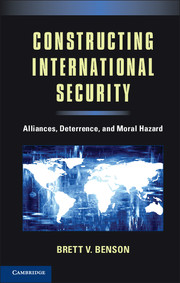Book contents
- Frontmatter
- Contents
- Preface
- Acknowledgments
- 1 Understanding the Design of Security Commitments
- 2 A Typology of Third-Party Commitments
- 3 Time Consistency and Entrapment
- 4 Evidence of Moral Hazard in Military Alliances
- 5 A Theory of Commitment Design
- 6 Testing the Implications for Alliance Design
- 7 Deterrent Commitments in East Asia
- 8 Constructing Security in Today's World
- References
- Index
- References
8 - Constructing Security in Today's World
Published online by Cambridge University Press: 05 November 2012
- Frontmatter
- Contents
- Preface
- Acknowledgments
- 1 Understanding the Design of Security Commitments
- 2 A Typology of Third-Party Commitments
- 3 Time Consistency and Entrapment
- 4 Evidence of Moral Hazard in Military Alliances
- 5 A Theory of Commitment Design
- 6 Testing the Implications for Alliance Design
- 7 Deterrent Commitments in East Asia
- 8 Constructing Security in Today's World
- References
- Index
- References
Summary
Since the 1990s, the security of the Taiwan Strait and that of the Korean peninsula have reemerged as international priorities. When the government of China conducted missile tests off the shore of Taiwan in 1995–1996, Taiwan's military went on heightened alert and the United States flexed its muscles by sending naval forces to the area. The crisis triggered questions and concerns about the suitability of the U.S. policy of strategic ambiguity to effectively manage tensions between China and Taiwan. China also faces growing questions about its security commitment to North Korea. In 1993, the government of North Korea announced its intention to withdraw from the nuclear nonproliferation treaty. The threat that North Korea might acquire a nuclear weapon rekindled tensions between North Korea and the United States–ROK alliance. The road to the present time has been rocky, with occasional bursts of violence, such as North Korea's shelling of the South Korean island of Yeonpyeong in 2010.
Although these crises did not escalate to war, they do raise questions about whether the policies of China and the United States, which were formed for these regions decades ago, are adequately designed to meet the current demands of the disputes. The U.S. policy of strategic ambiguity is a probabilistic commitment; it causes concern because of the intuitive belief that uncertainty tends not to enhance peace. China's policy toward North Korea is a conditional commitment, but North Korea's fearless pursuit of nuclear weapons and growing aggression toward South Korea raise the specter that China's commitment may not be an effective mechanism for restraining North Korea and may even unwittingly encourage its aggressiveness.
- Type
- Chapter
- Information
- Constructing International SecurityAlliances, Deterrence, and Moral Hazard, pp. 169 - 190Publisher: Cambridge University PressPrint publication year: 2012



